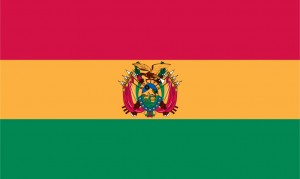Guest author for this article, Robert, is a UK writer living in Bolivia. He is currently a writer for Listen and Learn. Top 10 Bolivian Spanish Words and Expressions When you travel around South America you’ll realize the words and expressions used vary from one country to another. Sure, your Spanish level might be up […]
velay
A colloquial term used primarily in Spain, particularly in Andalucia, as an interjection to express surprise, doubt, or disbelief. It is similar to saying, 'Really?' or 'Is that so?' in English. Examples Spanish: ¿Velay? No me puedo creer que hayas ganado la lotería. English: 'Really? I can't believe you won the lottery.'
chaqui
A colloquial term used in Peru to refer to a hangover or the physical state after heavy drinking. Examples Spanish: Después de la fiesta de anoche, tengo un chaqui terrible. English: After last night's party, I have a terrible hangover.
quivo
A slang term primarily used in Mexico, 'quivo' is a shortened version of '¿Cómo está el ambiente?', which translates to 'How's the vibe/atmosphere?'. It is used to ask about the situation or mood of a place or gathering. Examples Spanish: Hola, ¿Cómo está el quivo en la fiesta? English: Hi, how's the vibe at the […]
fincho
A colloquial term mainly used in Argentina, Uruguay, and Paraguay which refers to a party or a gathering with friends. Examples Spanish: Este fin de semana vamos a hacer un fincho en mi casa. English: This weekend we are going to have a 'fincho' at my house.
camba
A term used in Bolivia to refer to the people from the eastern lowlands, especially Santa Cruz. It can be used in an affectionate, neutral, or derogatory way, depending on the context. Examples Spanish: Mi amigo es un camba, él es de Santa Cruz. English: My friend is a camba, he is from Santa Cruz.
chapaco
A term used in Bolivia to refer to people who are native to the Tarija region. It can also refer to the accent or dialect of Spanish spoken in that region. Examples Spanish: Mi amigo es un chapaco orgulloso y siempre habla con su acento característico. English: My friend is a proud chapaco and always […]
trancadera
A term used in some Latin American countries, primarily in Guatemala and El Salvador, to refer to a big fight or brawl. Examples Spanish: Después del partido de fútbol, hubo una gran trancadera entre los aficionados de los equipos rivales. English: After the football match, there was a big brawl between fans of the rival […]
corcho
In Spanish slang, 'corcho' is often used to refer to someone who is dull, stupid, or slow-witted. Examples Spanish: Estás como un corcho, no entiendes nada de lo que te digo. English: You are like a cork, you don't understand anything I'm telling you.
matacambio
A slang term primarily used in Argentina, 'matacambio' refers to a bad or unskilled driver. It literally translates to 'gear killer'. Examples Spanish: ¡Ese tipo es un matacambio! Siempre está frenando y acelerando sin razón. English: That guy is a gear killer! He's always braking and accelerating without reason.
caima
In Venezuela, 'caima' is a colloquial term used to refer to a friend or buddy. It can also be used to refer to a woman or girlfriend. Examples Spanish: Hola caima, ¿cómo estás? English: Hello buddy, how are you?
pucho
In certain regions, 'pucho' is a casual or slang term for a cigarette. It could also mean 'butt' or 'end' in the context of a cigarette. Examples Spanish: ¿Tienes un pucho? Quiero fumar. English: Do you have a cigarette? I want to smoke.
choco
In some Spanish-speaking regions, 'choco' is a colloquial term used to refer to a car accident or collision. It is also used in Spain to refer to a cuttlefish. Examples Spanish: 1) Ayer tuve un choco con mi coche. 2) Vamos a comer choco frito esta noche. English: 1) I had a car accident yesterday. […]
jailon
A Spanish slang term usually used in Spain to refer to a person who is flashy or showy, often with an emphasis on excessive or ostentatious style or behavior. Examples Spanish: Ese tipo es un jailon, siempre viste con ropa de marca y joyas caras. English: That guy is such a show-off, he always wears […]
kolla
A term used in some South American countries, particularly in Peru, to refer to a person of indigenous origin or to describe something related to the indigenous culture. Examples Spanish: La mujer kolla vendía artesanías en el mercado local. English: The indigenous woman was selling handicrafts at the local market.
macurca
The term 'macurca' does not exist in Spanish slang or any regional dialects. It could be a misspelling or a very localized term. Please check the spelling or provide more context. Examples Spanish: N/A English: N/A
petacuda
In Spanish slang, 'petacuda' is used to describe a woman who is physically attractive, especially referring to her body shape. It is often used in colloquial or informal contexts. Examples Spanish: La chica que acaba de pasar es una petacuda, tiene una figura impresionante. English: The girl who just walked by is a stunner, she […]
petacudo
A slang term used in Chile and some parts of Latin America, 'petacudo' is often used to describe someone who is arrogant, conceited, or full of themselves. Examples Spanish: No me gusta pasar tiempo con él porque es muy petacudo. English: I don't like spending time with him because he is very conceited.
chacharse
A colloquial term used in Spain, 'chacharse' refers to the process of becoming old or outdated. It can be used to refer to objects, people, or even trends that are no longer in style or have lost their appeal over time. Examples Spanish: Este coche se está chachando, es hora de comprar uno nuevo. English: […]
finde
Abbreviation of 'fin de semana', meaning 'weekend' Examples Spanish: Vamos a la playa este finde. English: We are going to the beach this weekend.
